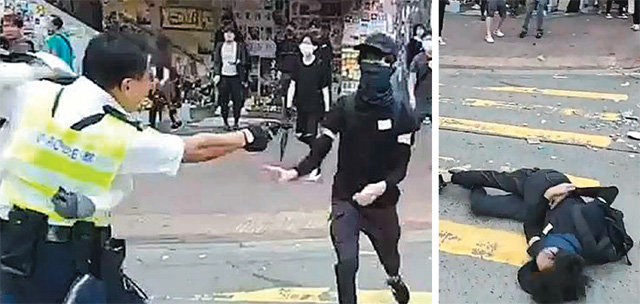Financial Times
Public execution, Tiananmen style: Hong Kong police cold-bloodedly shoots a young protester with a live round.

Hong Kong is on the edge of a precipice.
Late into Tuesday evening, protesters at several locations hurled Molotov cocktails at police who fired back volleys of tear gas.
Since the weekend, a protester has been shot by police with a live round, and a man horrifically set alight after confronting demonstrators.
Violence that has been building for months has reached a critical pitch.
With neither side appearing ready to back down, the danger is now real of a tragedy on a far broader scale.
Blame for the current crisis must be laid primarily at the feet of the Hong Kong government and Beijing.
Since the protests began in April, both have underestimated the demonstrators’ seriousness and resolve.
Concessions have been too little, too late.
Had Carrie Lam, Hong Kong’s chief executive, withdrawn the extradition bill that originally triggered the demonstrations when they were still peaceful mass marches, she might have defused the situation.
Instead, she initially only suspended the bill instead of cancelling it, and only after the first bloodshed.
This sent protesters a damaging message: that only violence brought results.
Continued mishandling of the crisis by the Hong Kong authorities has led to the loss of their legitimacy in the eyes of the population.
In a sign of how sentiment has shifted, office workers in suits could be seen cheering black-clad demonstrators in full battle dress as they ran through the city’s central business district on Tuesday. Having lost popular legitimacy, the authorities have resorted instead to police rule.
In the absence of any political resolution, the brutal police find themselves, invidiously, on the front lines, expected to govern what has become an ungovernable city through force.
Since they only have one set of tools, an inevitable cycle of escalation has set in.
The city no longer has a law and order problem, but a rule of law problem.
Now there are signs that Beijing is preparing to take an even harder line.
Protesters fear further steps to erode the rights and freedoms Hong Kong has enjoyed since the end of British rule in 1997, which are guaranteed in the Basic Law that came into effect at the handover. Chinese officials have signalled a desire for legislative and education reforms in the city, including strengthening security legislation.
An article of the Basic Law said Hong Kong should enact laws to prohibit “treason, secession, sedition [or] subversion” against the central government.
But a move to implement that through a national security bill in 2003 was dropped after half a million people protested.
Any attempt to introduce a national security law now would be seen as a final straw by demonstrators.
If Beijing intends to push through such legislation, the only way it might succeed could be by also enacting another unfulfilled article of the Basic Law — which set the “ultimate aim” of choosing Hong Kong’s chief executive by universal suffrage.
This has become the biggest of the demonstrators’ five demands.
The chances appear slim indeed.
Granting the universal suffrage demand would risk making Beijing appear cowed by violence, and setting a precedent for other parts of China.
Yet, balanced with an eventual commitment to introduce a national security law in Hong Kong, it could in theory provide the framework for a visionary compromise.
It might be the only route left to a peaceful end to the protests — and to averting the ever-increasing danger of a bloody military intervention from the mainland.

